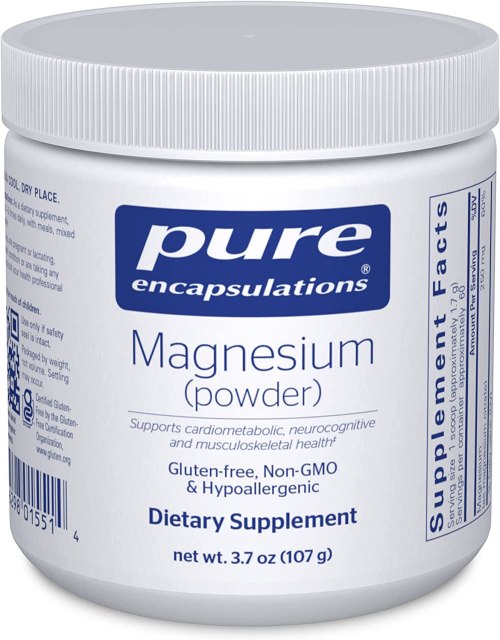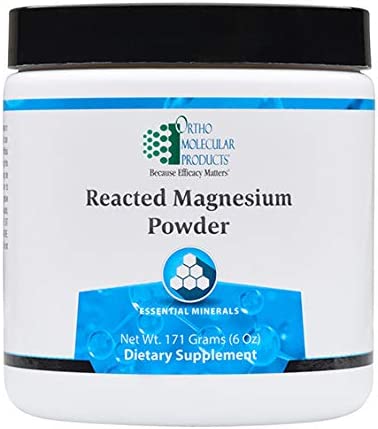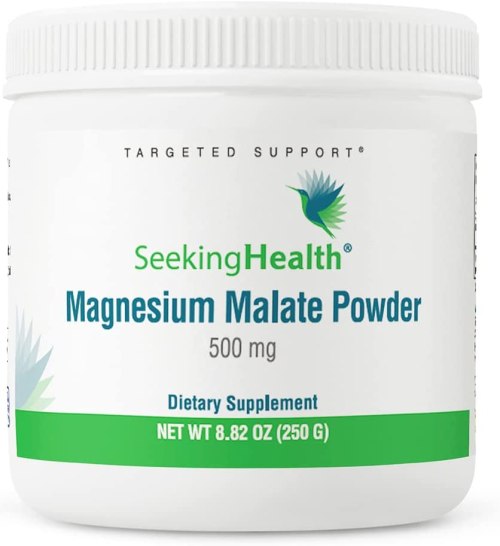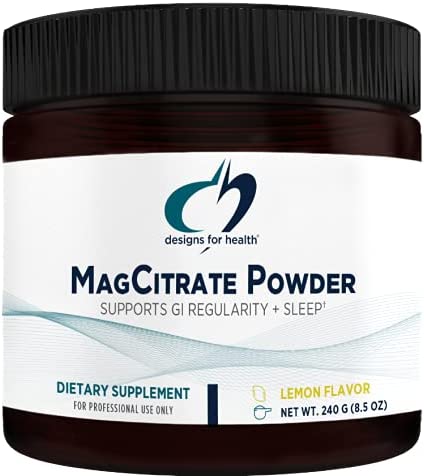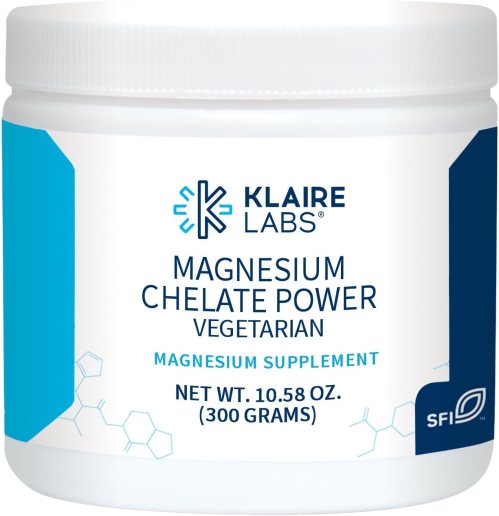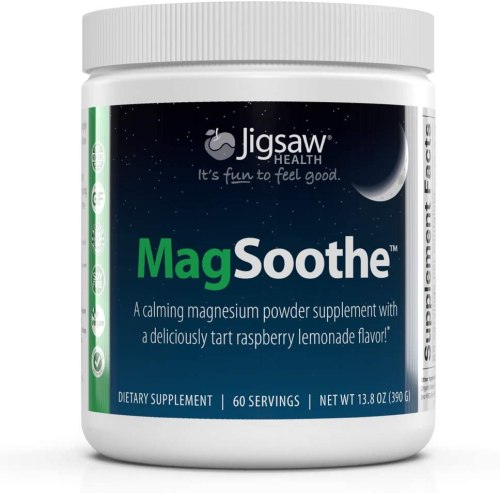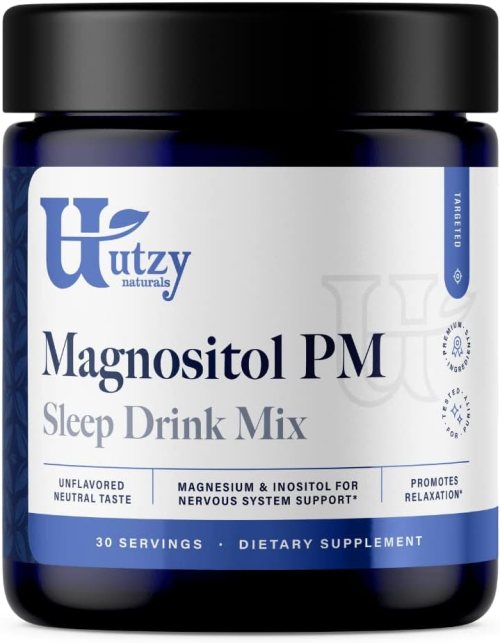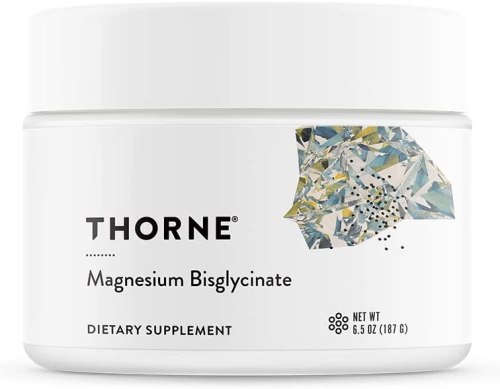Our editors independently select these products. Making a purchase through our links may earn Well+Good a commission
It can’t be stressed enough how essential of a mineral magnesium is—after all, it keeps our heart and gut healthy and thriving. In addition to the bounty of health benefits, magnesium plays a crucial role for our hydration levels, which is something you might be thinking about (even more) these days as the weather heats up. “While water is the primary source of hydration, electrolytes like magnesium are also necessary for maintaining proper fluid balance,” says Samantha Schleiger, MS, RDN, CD, CLT, IFNCP, an integrative and functional medicine dietitian. Magnesium-rich snacks are great, but if you’re specifically looking to amp up your hydration levels, look no further than the best magnesium powders.
Experts in This Article
registered dietitian and founder of Grounded Nourishment
integrative and functional medicine dietitian based in Elkhorn, Wisconsin
What are magnesium powders?
Magnesium can be absorbed in many forms, from capsules to magnesium body lotions. As the name implies, magnesium powders are the powdered form of magnesium. They are made by combining magnesium with other compounds like sodium and potassium, which increases the powder’s solubility and absorption in the body.
How do magnesium powders help with hydration?
Magnesium powders combined with sodium, potassium, and chloride can help support hydration. “These electrolytes play a vital role in maintaining fluid balance and may enhance the body’s ability to retain water,” Schleiger adds.
What types of magnesium powders are recommended?
According to Megan Gerber, RD, LD, IFNCP, CGN, a certified gastroenterology nutritionist and functional registered dietitian, she recommends magnesium glycinate or magnesium threonate. “Glycinate is extremely bioavailable and helps us improve our response to stress, supports muscle relaxation, and healthy sleep, says Gerber. Additionally, research has shown threonate to improve brain health, such as migraines, headaches, and Alzheimer’s disease.
Beyond these, there are a few other types of magnesium on the market that help with other health concerns. For example, magnesium oxide benefits those with constipation (by helping move your bowels), per Michigan Medicine, and magnesium citrate can be taken if you have a deficiency in the essential nutrient, per the Mayo Clinic.
How much magnesium is recommended per day
The National Institutes of Health (NIH)’s daily magnesium intake varies on age, gender, and whether someone is pregnant or breastfeeding.
- Adult males (ages 19-30): 400 mg
- Adult males (ages 31 and older): 420 mg
- Adult females (ages 19-30): 310 mg
- Adult females (ages 31 and older): 320 mg
- Pregnant females: 350-400 mg
- Breastfeeding females: 310-360 mg
Staying hydrated is two-fold. The first part requires intaking enough water. The second is electrolyte balance, and that’s where magnesium comes into play. We tapped registered dietitians about the best magnesium powders. Scroll down below to find the ones that’ll help quench thirsty cells.
Pure Encapsulations, Magnesium Powder — $29.00
Magnesium: 250 mg/serving
If you’re looking for an easy-to-mix and taste-free formula, Schleiger recommends Pure Encapsulations Magnesium Powder. “This formula offers an enhanced solubility form of the highly bioavailable magnesium bis-glycinate in a convenient powder form,” says Schleiger. Also nice? It’s free from allergens like wheat, gluten, peanuts, and preservatives. Clocking in at 250 milligrams per serving, this powder makes a great addition to smoothies, shakes, and meals to boost those hydration levels.
Pros
- Easy to mix
- Free of allergens
- Good value
Cons
- Only 250 mg per serving
Ortho Molecular, Reacted Magnesium Powder — $55.00
Magnesium: 300 mg/serving
Ortho Molecular’s Reacted Magnesium Powder offers a highly available form of magnesium—which means that it’s more easily absorbed into the body (hooray). Not only that, it mixes well and contains a high concentration of magnesium (a whopping 300 milligrams per serving). Featuring a strawberry-lemonade flavor, this powder can be added to water or any beverage to keep quenched over the summer.
Pros
- Contains a highly bioavailable form of magnesium
- Easy to mix
- Strawberry-lemonade flavor
- 300 mg per serving
Cons
- Expensive
Seeking Health, Magnesium Malate Powder — $22.00
Magnesium: 500 mg/serving
A whopping 500 milligrams await per serving in Seeking Health’s Magnesium Malate Powder. “The combination of magnesium and malic acid may be particularly helpful for healthy energy production in the cells,” says Schleiger. “This form of magnesium is reported to be gentler on the system and may have a less laxative effect than other types.” The good news: it’s free of fish, gluten, GMOs, peanuts, milk, shellfish, soy, and other allergens. Just pour a scoop in your beverage of choice or as directed by your healthcare professional and sip.
Pros
- Contains 500 mg per serving
- Gentler on body
- Free of allergens
Cons
- Some may not like the taste
Designs for Health, Magcitrate Powder — $43.00
Magnesium: 300 mg/serving
One scoop of this orange-flavored magcitrate powder serves up a whopping 300 milligrams per serving. What’s neat about this powder is that it shouldn’t cause any GI sensitivities (since magnesium sometimes does) due to the stable chelate formed between the glycerin molecules and magnesium, according to Schleiger. The result of adding a scoop into your water or favorite beverage is a non-fizzy, lightly sweetened drink that tastes like orange juice and doesn’t irritate the bowels. All you have to do is add in a scoop, shake well, and sip sip sip.
Pros
- 300 mg per serving
- Orange-flavored
- Non-fizzy and lightly sweetened
Cons
- Expensive
Klaire Labs, Magnesium Chelate Powder — $45.00
Magnesium: 200 mg/serving
This fast-dissolving powder is one to add to your regimen. Logging in 200 milligrams per serving and featuring a hypoallergenic formula, this powder is not likely to irritate anyone’s GI tract while keeping your body quenched. It mixes easily into smoothies, water, or juices and is free of potential allergens like fish, soy, gluten, and peanuts. Plus, “no flavors or sweeteners are added,” says Schleiger.
Pros
- 200 mg per serving
- Free of allergens
- Mixes easily
Cons
- Expensive
Jigsaw, Mag Soothe — $42.00
Magnesium: 200 mg/serving
You heard it from Schleiger. This is “a great-tasting, fast-acting, calming magnesium supplement powder, utilizing the highly bioavailable magnesium lysinate glycinate chelate exclusively from Albion Labs, combined with bicarbonate,” she tells us. Magnesium and bicarbonate work together to enhance absorption inside the body, so our body can soak this up pretty darn fast. Boasting a raspberry lemonade flavor and calming properties, this powder is not only easy to drink but will put you straight to snooze city. It’s a win-win for your hydration levels and sleep.
Pros
- 200 mg per serving
- Raspberry lemonade flavor
- Has calming properties for sleep
Cons
- Expensive
Utzy Naturals, Magnositol Pm — $36.00
Magnesium: 200 mg/serving
This magnesium- and inositol-infused powder was designed to not only amp up your hydration levels, but induce a sense of calm to help you get a good night’s Zzz. Formulated with chelated magnesium bis-glycinate, this powder can be more readily absorbed into the body. “I love that this formula is made with inositol, one of the most versatile nutrients for promoting brain wellness, a positive and relaxed mood, and restful sleep,” explains Schleiger.
Pros
- 200 mg per serving
- Absorbs quickly
- Has calming properties for sleep
Cons
- Some may not like the taste
Thorne, Magnesium Bisglycinate Powdered Magnesium — $48.00
Magnesium: 200 mg/serving
If you want a magnesium powder backed with research, look no further than Thorne. “Their products are made in a lab that meets quality and safety standards set by NSF International and the Therapeutic Goods Administration (TGA),” says Schleiger. Free of added sugars, thickeners, and artificial flavors, this powder is only flavored with monk fruit concentrate and delivers 200 milligrams of magnesium per serving. Highly absorbable, good flavor, and sans artificial ingredients—this powder with water is worth sipping on.
Pros
- 200 mg per serving
- Flavored with monk fruit concentrate
- Meets quality and safety standards set by NSF International and TGA
Cons
- Expensive
Sign Up for Our Daily Newsletter
Get all the latest in wellness, trends, food, fitness, beauty, and more delivered right to your inbox.
Got it, you've been added to our email list.

